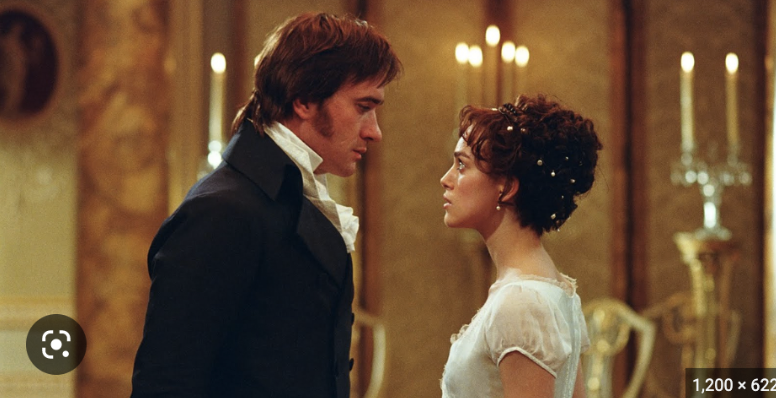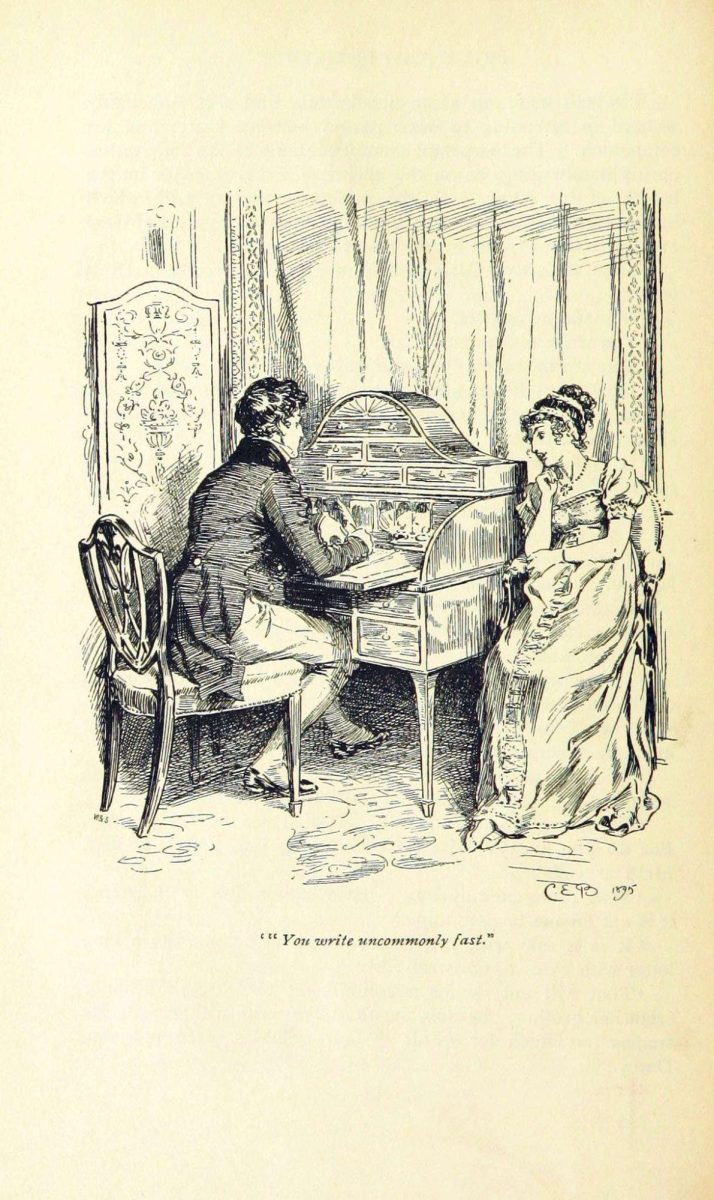The novel Pride and Prejudice by Jane Austen is centered around the emotional development of Elizabeth Bennet and Mr. Darcy, the two protagonists who are two worlds apart and separated by rank. The novel focuses on their evolution from prideful people who accept the social ranking to individuals who are able to cast aside their differences and realize the superficial nature of the class system. It is only through their individual growth that they are able to realize their love for one another.
Elizabeth Bennet, the heroine of Pride and Prejudice, is a trailblazer; constantly defying the expectations of society with her admirable courage, outspoken attitude, confidence, and her witty attitude. Elizabeth, who is of the lower class, is the most intelligent and sensible among her other five sisters. She is a proper young lady and believes that she’s a good judge of character. However, Elizabeth is quick to judge others, forming prejudices about others before giving these people a chance to defend themselves. “I can much more easily believe Mr. Bingley’s being imposed on, than that Mr. Wickham should invent such a history of himself as he gave me last night; names, facts, everything mentioned without ceremony. If it be not so, let Mr. Darcy contradict it. Besides, there was truth in his looks.” (Austen, 86-87). Elizabeth immediately believes Mr. Darcy to be guilty of treating George Wickham badly, solely on the words of Wickham without hearing Mr. Darcy’s side of the story. She doesn’t consider that Wickham may be lying and deceiving her, which he is, and she remains blind to her prejudice against Mr. Darcy. Elizabeth thinks very highly of herself, but over the course of the novel she comes down off her pedestal. “She grew absolutely ashamed of herself. Of neither Darcy nor Wickham, could she think, without feeling that she had been blind, partial, prejudiced, absurd.”(Austen, 204). Elizabeth’s revelation sinks in and she realizes how wrong and prejudiced she has been about both Darcy and Wickham.Which leads to a painful, but needed, moment of self-awareness for her. While this makes her feel humiliated and foolish, it allows her to grow and stop judging others based on initial prejudices she may hold against them.
Mr. Darcy is not of the lower rank, instead he is a wealthy aristocrat and the heir to the Pemberley estate. He and Elizabeth are both intelligent and well read, but Mr. Darcy is vain, arrogant, and has a stoic demeanor that causes him to appear standoffish and uncivil. He sees anyone that is below him as inferior and prefers not to communicate with them. Mr. Darcy’s god complex can be seen in his first appearance in the novel. When he first enters the ball room he catches everyone’s attention by his tall height and handsome features. However, when he speaks Elizabeth learns that he is just another arrogant, rich man who has put himself on a pedestal and thinks the world of himself, “Turning around, he looked for a moment at Elizabeth, till catching her eye, he withdrew his own and coldly said, “She is tolerable; but not handsome enough to tempt me; and I am in no humor at present to give consequence to young ladies who are slighted by other men.” (Austen, 13). Elizabeth’s distaste for Mr. Darcy only grows from their first interaction. Later on in the novel, when Darcy gives his idea of what an accomplished woman is, Elizabeth responds sarcastically by saying, “I am no longer surprised at your knowing only six accomplished women. I rather wonder at you knowing any,” (Austen, 40). This line contributes to the novel’s tone of sarcasm and criticism and shows Elizabeth’s witty nature.
However, as Mr. Darcy’s character develops, his integrity and compassion become the driving illustration of good behavior. His kindness is seen through his interactions with Elizabeth and the Gardiners during their visit at the Pemberley estate. Mr. Darcy is remarkably polite and welcoming to the group. Elizabeth notices, “This was a stroke of civility for which she was quite unprepared; and she could hardly suppress a smile, at his being now seeking the acquaintance of some of those people, whom his pride had revolted, in his offer to herself” (Austen, 248). Elizabeth is taken with Darcy’s shift in behavior from cold and aloof to kind and outgoing.
Another way Austen shows Elizabeth’s outspoken attitude is when Elizabeth confronts Lady Catherine de Bourgh about scheming to prevent her and Darcy’s upcoming marriage. Elizabeth contradicts the idea that since Mr. Darcy is a man of higher rank, he is her superior. Elizabeth insists that she and Darcy are equal and she loves him. “In marrying your nephew, I should not consider myself as quitting that sphere. He is a gentleman; I am a gentleman’s daughter; so far we are equal.” (Austen, 258). Elizabeth shows strength and integrity as she stands by her idea of marrying for love instead of security. Not wanting to see Darcy end up with someone of lower class status, Lady Catherine is horrified by Elizabeth’s claim and vows to do anything she can to stop the marriage from happening. Lady Catherine’s determination to keep Elizabeth and Darcy separate would only strengthen their connection and love for each other. Austen purposely portrays Lady Catherine in a rude and socially inappropriate way to showcase Elizabeth’s fearless attitude when it comes to those of a higher rank. “I am not to be intimidated into anything so wholly unreasonable…You have widely mistaken my character, if you think I can be worked on by such persuasions as these. How far your nephew might approve of your interference in his affairs, I cannot tell; but you certainly have no right to concern yourself in mine.” (Austen, 343). Elizabeth stands up for herself and for Darcy, and speaks her mind no matter the consequence.
Initially pitted as enemies, Elizabeth and Darcy grow to respect each other’s differences and develop a love that lasts for the ages. As part of a lengthy proposal, Darcy says to Elizabeth, “…You are too generous to trifle with me. If your feelings are still what they were last April tell me so at once. My affections and wishes are unchanged; but one word from you will silence me on this subject forever” (Austen, 354). Darcy’s love for Elizabeth proves to have a strong influence over him, as he begins to understand his mistakes and faults, vowing to change himself for the better, “You taught me a lesson, hard indeed at first, but most advantageous. By you, I was properly humbled” (Austen, 357). Elizabeth and Darcy overcome their initial distaste for each other because of their admiration and respect for each other’s intelligence and comportment. At the beginning of Jane Austen’s novel Pride and Prejudice, Mr. Darcy is presented as being proud and arrogant, while Elizabeth is decidedly prejudiced and quick to judge others. During this time period, people from the classes act as they are expected to instead of acting with their true feelings and intentions. A key example of this is that throughout the novel, Darcy was struggling with the internal conflict of falling in love with someone who was in the lower class. By the end, Darcy is able to overcome society’s expectations and is able to love Elizabeth, no matter her social standing, and accepts her for who she is.
Over the course of the novel, Austen develops both Darcy and Elizabeth and they begin to fall in love with each other and, in turn, realize their own character faults. As Elizabeth learns about Darcy and his life, she comes to the conclusion that she was too quick to judge Mr. Darcy. Well, she never verbally states this when accepting his proposal. the narrator alludes to this idea in chapter 58, “Elizabeth feeling all the more than common awkwardness and anxiety of his situation, now forced herself to speak; and immediately, though not very fluently, gave him to understand, that her sentiments had undergone so material a change, since the period to which he alluded, as to make her receive with gratitude and pleasure, his present assurances.” (Austen, 357.) The language with which Austen indicates Elizabeth’s acceptance was purposely written to capture the moment of incoherent joy for Elizabeth, who is usually well-spoken and quick to respond. Elizabeth allows herself to admit that her love for Mr. Darcy has supplanted her long-standing prejudice. This realization allows for Elizabeth to become less critical and judgmental of others.
Through the depiction of the major changes that Elizabeth and Darcy go through, Austen is demonstrating the manner in which love between a couple can not only shift their perspective of the world but also of themselves. Austen’s use of the narrator’s attitude toward various characters and events is often sarcastic, enabling a wide variety of satirical characters and situations. Austen is able to show in Pride and Prejudice that love has no “rank”. Darcy and Elizabeth had to adjust to each other and lose their sense of pride and their prejudices in order to follow their hearts. Once they were able to follow their hearts, they were able to help each other grow and become better people.
Works Cited:
“Pride and Prejudice” Jane Austen. Barens and Noble Classics, 2003.


